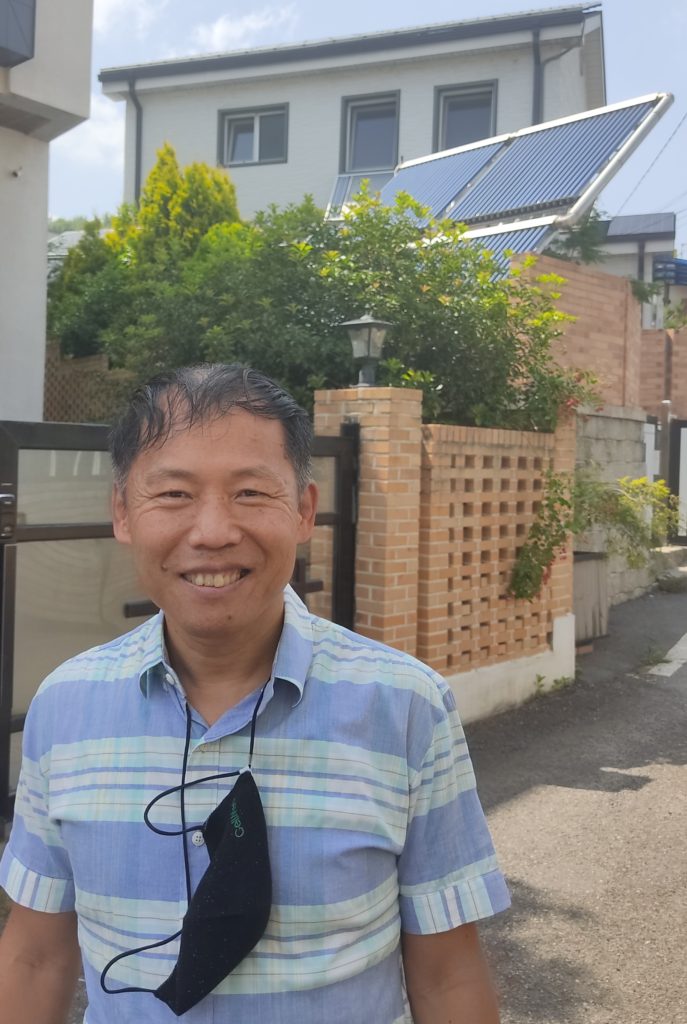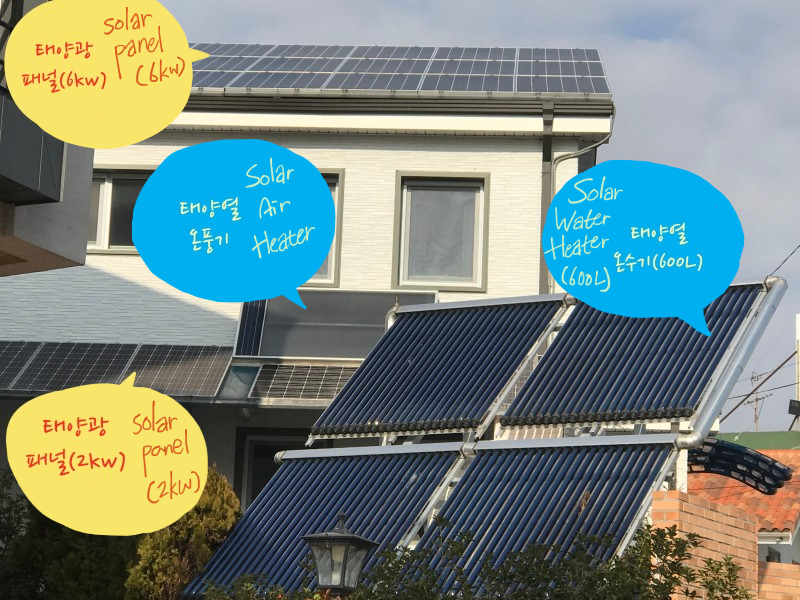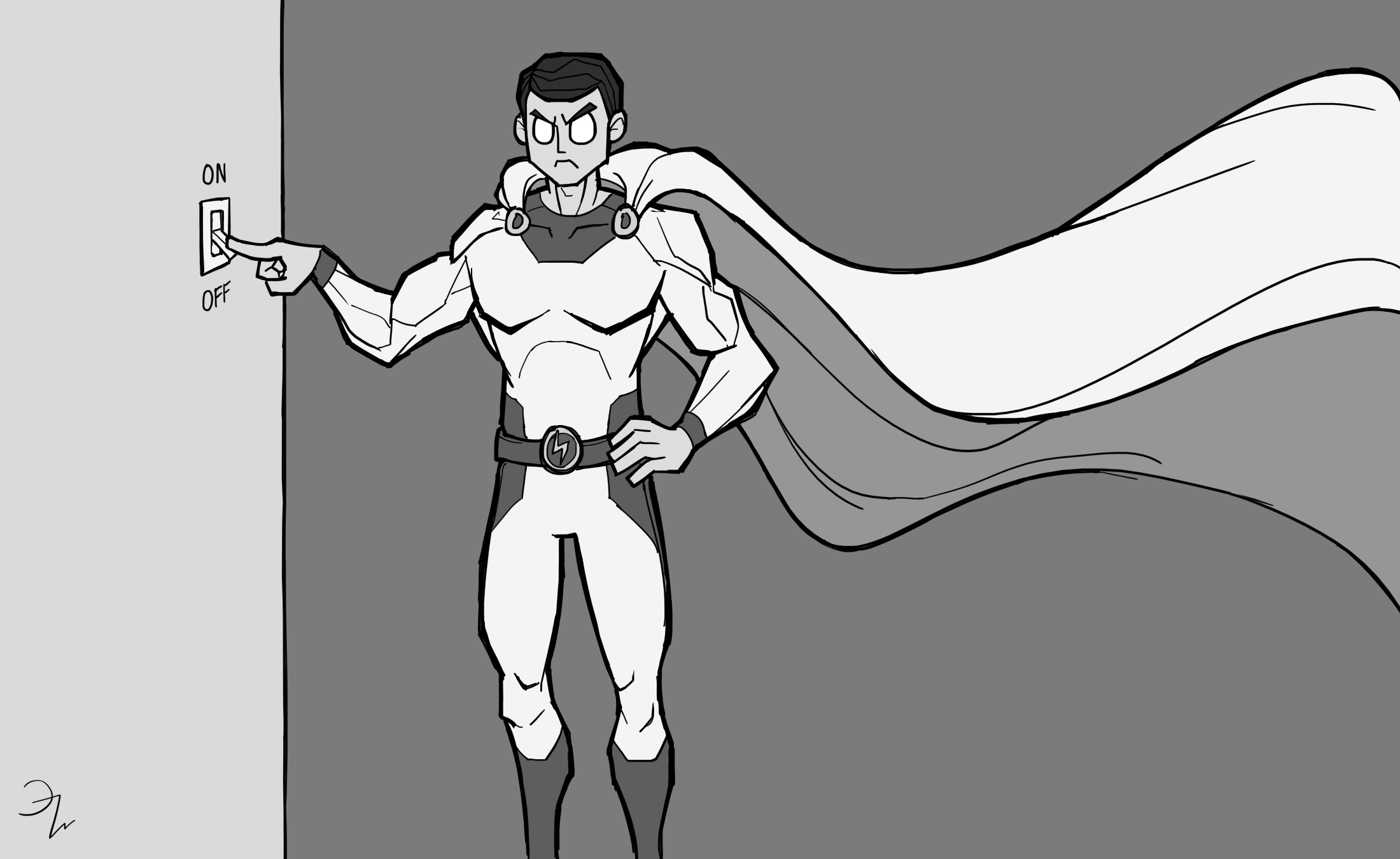Energyman and His “Energy-Plus” House
By Chung Hyunhwa.
Superheroes such as Batman, Ironman, or Antman appear in times of trouble. We are facing an awful climate crisis and we certainly need some help from such superheroes. Here, we have Energyman to the rescue! Energyman, Mr. Jeong Inbong, who is actively working to fight against the climate crisis, is living in his “energy-plus” house in Ilgok-dong on the north side of Gwangju.
Energyman or Eelman?
Earlier, I was looking for ways to make my place more energy efficient, and the idea of a solar air heater, an appropriate type of technology, sounded terrific. Once installed, this can heat the air up to 75°C with only sunlight and keep the indoor temperature above 28°C. If you like DIY projects, it is quite affordable. A lot of people consider “appropriate technology” to be for people in developing countries, while people living in developed countries use electricity to heat and cool rooms, clean the house, and even dry clothes. We may easily think that using more energy is the expression of affluence. However, soon we will be forced to not use fossil fuels for energy because they release greenhouse gases into the air, which remain in the atmosphere for over one hundred years. I searched to find someone who already was experienced with the solar air heater system because I was fascinated by the fact that all it takes is sunlight and a low-budget structure. Luckily, I found Energyman! I visited him after reading a couple of articles on his blog, as he seemed like an interesting person. He had installed solar panels, a solar air heater, and a solar water heater at his house. He also charges the batteries of his beam projector for the classes he teaches by pedaling his mini-generator. He literally transforms human power into electricity. Maybe I should call him “Eelman” instead!
“Energy-Plus” House
It was one fine Monday when I finally met Energyman, Jeong Inbong, in the small front yard of his house. His two-story house was surrounded by other houses, but even though it was not so big, it stood out because of the solar panels and solar heating systems rising above the roof. He started explaining about the solar air heater, which was my initial interest. When he was building his house, he told me that he was very willing to adopt any technology that was going to save him from using fossil fuels or nuclear power. Unlike the DIY solar air heater I had in mind, his system was a fancy one from Germany. He also invested money in a solar water heater. The air heater had a long tube in a box with a transparent cover to collect heat from the sun, and there was an automatic fan run by a small solar panel on the box to draw air inside the house. The tube was connected to the house through a hole in the wall. I got to feel the warm air from it. The water heater heated water and kept it in a tank. It provided hot water most of the time throughout the year. His house is an “energy-plus” house because it generates more energy than he needs in this way. He advises that installing solar panels is the most efficient and simplest way to be energy efficient because you can use the power to boil water and heat or cool rooms flexibly.

More Secrets
The house itself was, in fact, very energy efficient because the walls were twice as thick as an average home due to the insulation. He has installed airlock windows (in Korean, 시스템창호) to minimize the loss of heat, and the house was also equipped with a dump heat exchanger control to reuse the heat in the house, which makes it a semi-passive home. He avoided using cement for the structure because it would emit carbon dioxide and other hazardous gases. There are 6kW solar panels on the roof, and 2kW panels in front of the house working as shade. Some people may worry about the electromagnetic waves from the solar panels, but according to Mr. Jeong, if you are a meter away from the inverters that are outside the house, you are safe. Even though he is producing enough energy for his family of four, he is still very cautious about using unnecessary energy.
Lifestyle
I was very moved by Mr. Jeong’s lifestyle. Not only does he refuse to use fossil/nuclear energy, but also he and his family eat only plant-based food because it affects the environment the least. He has been a vegan for 25 years. Mr. Jeong currently works for the Climate Action Vegan Network and Gwangju Sunlight Generation Cooperative. He also teaches about the climate at Gwangju Wisdom School. He did his doctoral studies in food and medicine at Chosun University and practices a one-meal-a-day diet, both for health and for environmental reasons. He does not even own a car.

Decide to Be a Hero!
In these times of climate difficulties, I hope there will be an innovative way soon to remove massive amounts of carbon directly from the atmosphere. But until scientist heroes invent a way to do this, we need more eco-heroes like Mr. Jeong, the Energyman. What is positive is that we can all become this kind of hero by reducing the unnecessary loss and waste of energy. Putting solar panels on rooftops is one way. Adding extra insulation to our buildings is also a great idea. Some people who do not have space for solar panels at their homes are getting together to establish solar energy farms. Some are talking about climate justice for those who, despite being the least responsible for creating these climate problems, are vulnerable during unexpected winter storms and summer heat. One may argue that the industrial sector is consuming the majority of energy inefficiently, so this needs to change first and urgently. Yes, but we also should do what we can, and it all starts from something as small as turning off one switch. Be a hero and help save humankind.
Tips for Saving Energy in a Healthy Way
- Be careful when using appliances that require standby power.
- Do not keep rice warm in the rice cooker.
- Eat more fresh veggies to avoid using energy for cooking.
- Use a smaller refrigerator, which is also good for having fresher food.
- Go to bed earlier and get up earlier to use the daylight more.
- Increase time for reading and exercising rather than using the computer or TV.
- Use stairs instead of an elevator.
- Avoid doing the laundry when it is unnecessary.
- Save tap water, which requires energy to be delivered to homes.
- Use fewer dishes for meals to save water (you can even use just one plate when at a buffet-style restaurant).
- Add insulation for more efficient heating and air conditioning.
- Install airlock windows.
- Cool the roof by painting it a heat-reflecting color.
Illustration by Wi Hunho.
Photographs courtesy of Chung Hyunhwa.
The Author
Hailing from Gwangju, Chung Hyunhwa is currently leading Gwangju Hikers, an international eco-hike group at the GIC, and getting ready to teach the Korean language. Previously, she taught English in different settings, including at Yantai American School and Yantai Korean School in China. Ms. Chung has also worked for the Jeju school administration at Branksome Hall Asia in recent years. She holds a master’s degree in TESOL from TCNJ in the U.S.







